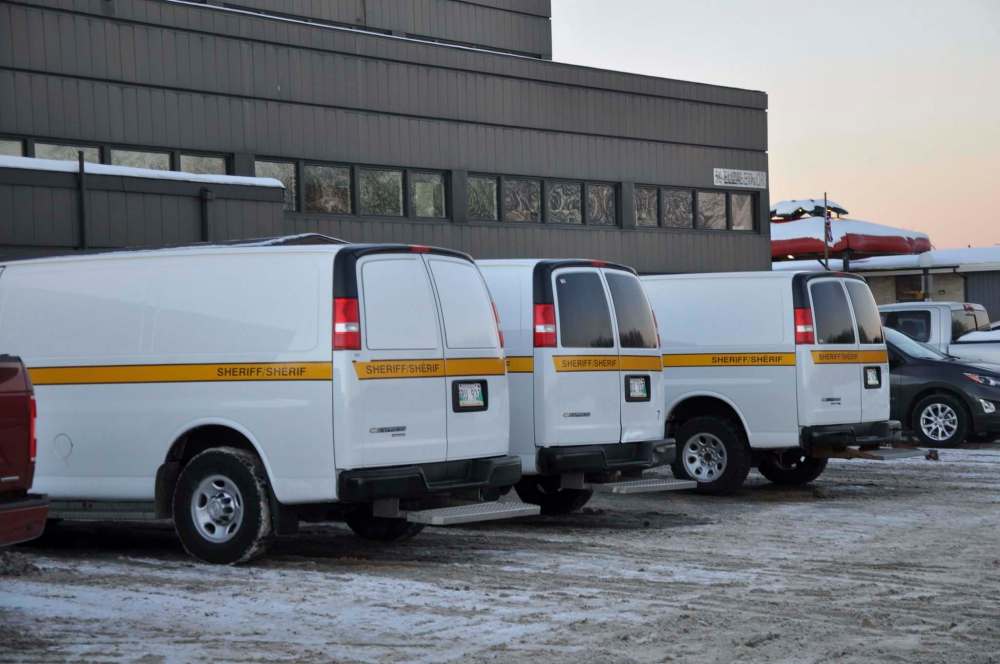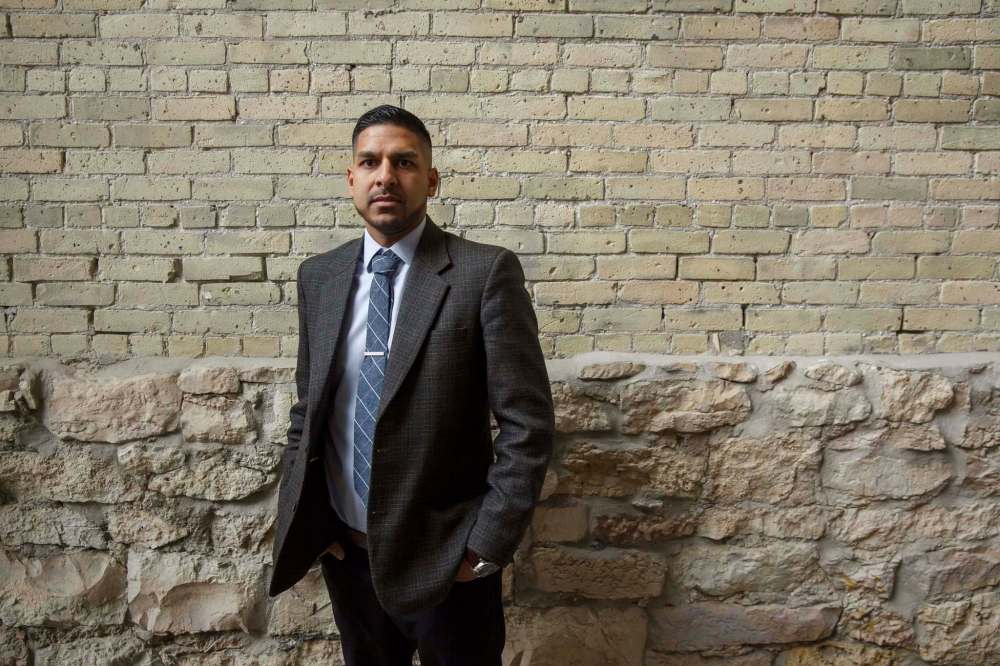The high price of injustice Manitoba spends about $1.5 million annually on an overwhelmed, weather-delayed 'flying circus' northern circuit court system that many communities don't trust
Read this article for free:
or
Already have an account? Log in here »
To continue reading, please subscribe:
Monthly Digital Subscription
$0 for the first 4 weeks*
- Enjoy unlimited reading on winnipegfreepress.com
- Read the E-Edition, our digital replica newspaper
- Access News Break, our award-winning app
- Play interactive puzzles
*No charge for 4 weeks then price increases to the regular rate of $19.00 plus GST every four weeks. Offer available to new and qualified returning subscribers only. Cancel any time.
Monthly Digital Subscription
$4.75/week*
- Enjoy unlimited reading on winnipegfreepress.com
- Read the E-Edition, our digital replica newspaper
- Access News Break, our award-winning app
- Play interactive puzzles
*Billed as $19 plus GST every four weeks. Cancel any time.
To continue reading, please subscribe:
Add Free Press access to your Brandon Sun subscription for only an additional
$1 for the first 4 weeks*
*Your next subscription payment will increase by $1.00 and you will be charged $16.99 plus GST for four weeks. After four weeks, your payment will increase to $23.99 plus GST every four weeks.
Read unlimited articles for free today:
or
Already have an account? Log in here »
Hey there, time traveller!
This article was published 22/04/2019 (2423 days ago), so information in it may no longer be current.
In Manitoba’s North, where 15 circuit courts dot the vast and remote geographical area, a single delay costs the province an average of $10,000.
The delays happen all the time and for many reasons: weather that’s too cold or too stormy, airplane mechanical issues, a lack of heat or running water in public buildings on the ground. Back-to-back delays have resulted in cases being thrown out of court.
As Manitoba tries to curtail costly court delays, a provincial government review is examining the inner workings of a circuit court system that stretches from its southern border up to the subarctic.
"Obviously, we’re trying to get into those communities, making sure that individual communities and individuals have timely access to justice. We’re covering a large area there but we want to make sure that we’re doing everything we can to get into those communities," says Manitoba Justice Minister Cliff Cullen.

The human and financial costs of travelling to court in remote communities is the focus of the second instalment in a three-part Free Press series examining access to justice in northern Manitoba.
Despite its chronic lack of resources and consistently high case volumes, Thompson’s court office is responsible for running temporary court sessions in 13 of the northernmost communities in Manitoba. It’s a task that has overwhelmed the judicial centre of the North, leading to problems with attracting and keeping court staff and causing unconstitutional delays in hearing criminal cases.
Those rampant, systematic delays have caught the attention of the Canadian Civil Liberties Association, which has promised to launch court challenges against what it calls the "unconstitutional design" of northern courts.
In an effort to reduce the strain on the Thompson prosecutions office, which was without a supervising Crown attorney for 10 months until January, Winnipeg Crown attorneys are now responsible for prosecuting crimes in Norway House and Cross Lake, two of the largest First Nations communities in northern Manitoba. There are eight Crown attorneys in the Thompson office. A full complement was 12, before cases from those two communities were moved south.
Supervising Crown attorney Kyle Parker said a major challenge they face is “all things tied to transportation for our system… that’s the major difference between prosecuting in the North and prosecuting in the South of Manitoba.”
One of his predecessors, David Gray, goes further.

“One of the most offensive things about the way we administer justice in Manitoba is the great flying circus, as it was described in the Aboriginal Justice Inquiry," says Gray, who represented the Manitoba Metis Federation at the AJI nearly three decades ago.
"And it’s not changed an iota."
Manitoba spends an average of $1.3 million a year transporting prisoners by air and flying judges, lawyers and court clerks to circuit courts across the province. The bulk of that money is spent on flights leaving from Thompson, and it doesn’t include the cost of flying victims and witnesses to court when they’ve been subpoenaed to testify; that’s an extra $260,735 province-wide, according to data provided by Manitoba Justice.

!function(e,t,s,i){var n=”InfogramEmbeds”,o=e.getElementsByTagName(“script”)[0],d=/^http:/.test(e.location)?”http:”:”https:”;if(/^/{2}/.test(i)&&(i=d+i),window[n]&&window[n].initialized)window[n].process&&window[n].process();else if(!e.getElementById(s)){var r=e.createElement(“script”);r.async=1,r.id=s,r.src=i,o.parentNode.insertBefore(r,o)}}(document,0,”infogram-async”,”https://e.infogram.com/js/dist/embed-loader-min.js”);
A provincial government review of its circuit court system completed earlier this year has unearthed in-depth figures on the time and money Manitoba spends to deliver justice in the North — none of which the justice minister was prepared to reveal in an interview with the Free Press. The only figure that has surfaced is the $10,000 cost attributed to court delays in fly-in northern communities. A spokeswoman for Manitoba Justice said the department hasn’t recalculated that cost since the province switched aircraft carriers earlier this year.
A freedom of information request seeking Justice Department records about circuit courts and transportation was partially denied. Staff cited the ongoing internal review in refusing to disclose some of the information, and said they would need more time before they would be able to provide the rest.
Earlier this year, for the first time as justice minister, Cullen visited the Thompson court office. He met with provincial Chief Judge Margaret Wiebe in late February, and he says the province is “working closely” to address concerns, including retention of court staff. He says renovations to the court office are on the horizon, along with a video conferencing terminal so lawyers can speak with clients who are jailed hundreds of kilometres away. Earlier this month, defence lawyers were granted reliable access to wireless Internet at the court office for the first time.
“We have done, and we’re continuing to do, work on that front to make sure that individuals have timely access to justice,” Cullen says.

!function(e,t,s,i){var n=”InfogramEmbeds”,o=e.getElementsByTagName(“script”)[0],d=/^http:/.test(e.location)?”http:”:”https:”;if(/^/{2}/.test(i)&&(i=d+i),window[n]&&window[n].initialized)window[n].process&&window[n].process();else if(!e.getElementById(s)){var r=e.createElement(“script”);r.async=1,r.id=s,r.src=i,o.parentNode.insertBefore(r,o)}}(document,0,”infogram-async”,”https://e.infogram.com/js/dist/embed-loader-min.js”);
While technology has been touted as the solution to many of the transportation problems posed by Manitoba’s vast geography, reliable access to it has been hard to come by. When that technology goes awry, people awaiting criminal trials in northern Manitoba are disproportionately disadvantaged. Problems with the phone and video-conferencing systems used in provincial correctional centres — coupled with demanding travel schedules — have prevented meaningful conversations with clients, according to defence lawyers working in the North.
Those concerns have been echoed by the Law Society of Manitoba. The regulatory body aired those concerns to Manitoba Justice last year, according to a memo issued in December 2018. It noted limitations with the province’s Lawyer Video Interview service have a "disproportionate impact on lawyers practising in the North.”
“It’s expensive to do justice right anywhere, especially in northern Manitoba," says Thompson defence lawyer Simon Jack.

Meanwhile, sheriff’s officers travelling outside of Winnipeg racked up 868,760 kilometres in mileage while transporting prisoners in 2017-18 — enough to drive across Canada more than 100 times. They also travelled 194,503 kilometres by air with inmates.
The mental and physical strain of those long trips, and the lack of cellphone service and proper facilities to be found along the way, has the provincial government employees’ union calling for consistent safety standards for all court workers across Manitoba. They’ve heard from sheriffs in the North “that for far too long now, Manitoba Justice has failed, they haven’t looked after the serious security and safety issues in the rural areas and, especially, in the northern courthouses,” MGEU president Michelle Gawronsky says.

“They need to ensure that everyone is afforded the same protection, and that is one of the biggest concerns that they come across,” she says. “Just because I’m in Thompson doesn’t mean that I don’t need to be as safe as someone working in Winnipeg.
“It’s like having a two-tier system, those in the city and those outside.”
Manitoba’s network of circuit courts stretches from Emerson at the U.S. border up to Churchill.
The pop-up court sessions — held in community centres, arenas, legion halls, band offices and public buildings — are supposed to show local residents that justice is being done where they live. In the North, though, they’re regularly thwarted by winter weather, deaths in close-knit communities, overloaded dockets and a lack of basic infrastructure, such as heat and running water.
Long journey to justice
For teens arrested in northern Manitoba, being denied bail always means being shipped hundreds of kilometres south to one of the province’s two youth jails. Only the Manitoba Youth Centre in Winnipeg and Agassiz Youth Centre in Portage la Prairie are equipped for underage prisoners; young people from all over the province are sent to one of the two facilities. For teens arrested in northern Manitoba, being denied bail always means being shipped hundreds of kilometres south to one of the province’s two youth jails. Only the Manitoba Youth Centre in Winnipeg and Agassiz Youth Centre in Portage la Prairie are equipped for underage prisoners; young people from all over the province are sent to one of the two facilities. The distance is often too far for families to visit, leading to concerns that kids are more likely to get stuck in a cycle of criminal behaviour if they have no other support systems around them. The justice system can seem like a “big cloud of mystery” for families, says Judy Klassen, Liberal MLA for Kewatinook. She adds there’s often no one to help them find their way through the youth corrections system to arrange visits with their relatives. “You still have to maintain family relations, right, because there is a chance that these kids can go back on the right path if (they have intervention) immediately and if the families are allowed to come visit and talk with them, and make sure those connections are established,” Klassen says. Even when youths are granted bail, there’s no guarantee they’ll be released promptly. Youths and adults who are arrested in Manitoba’s northernmost communities usually have to be taken to court in Thompson to apply for bail. Youths get priority on the busy bail dockets, but they can be released only if there’s an adult present to pick them up — a challenge when home is hundreds of kilometres away. During the week a Free Press reporter was in Thompson’s court office, one teen boy had to be taken into CFS care in order to be released on bail so that a child-welfare worker could get him on a plane to fly home. Lawyers who work in the North say this is not uncommon. “The fact that youth need to be released to an adult and we are taking these kids from the communities where their adults are has posed all kinds of problems and does occasionally mean kids are remanded into custody where they would not be if they were in Winnipeg,” says Thompson Legal Aid lawyer Serena Puranen. Guardians must be notified within 24 hours of a youth’s arrest, but many families in the North don’t have phones or reliable vehicles to travel long distances to pick up their children, says lawyer Rohit Gupta. “If the parent isn’t able to be there, now we’re relying on the child-welfare system. And child welfare in the North is already overburdened. We face extreme difficulties in getting child-welfare (workers) to show up in court just so that a youth can be released to them,” he says. As part of a two-year pilot project to better respond to the concerns of youth and northerners, the Manitoba Ombudsman and the Advocate for Children and Youth teamed up to open a joint office in Thompson last Tuesday. The Ombudsman’s office has previously criticized the lack of youth detention centres and bail supervision programs in the North. In 2007, the ombudsman looked into the RCMP holding cells in Thompson and found that youths and adults, men and women, were all being held together in the same cells. The situation needed to be addressed immediately, the ombudsman said at the time. The 2007 report echoed the Aboriginal Justice Inquiry, which recommended youths should only be taken out of their communities if they are dangerous, as a last resort. In a subsequent report in 2008, the ombudsman’s office said no long-term solutions had been implemented. Since then, youths are being held in separate cells from adults at the Thompson RCMP detachment, which has 12 cells and three drunk tanks, and at the sheriffs’ lockup at the Thompson court office, which has a maximum capacity of 16 people. — Katie May
Months-long backlogs happen when circuit court sittings are regularly cancelled — a "not unforeseeable" predicament, as one northern judge put it. Some lawyers who spoke to the Free Press said by the time they arrive in a community and meet with all of the people who have charges on the docket, there is little time left to do anything else before they have to fly back out again. When the temperature dips below -35 C, legal aid lawyers adhere to a health and safety policy that considers it too cold to fly out to circuit courts.
“I just think that unfortunately we don’t build in enough safeguards to account for those weather-outs, but it certainly affects access to justice,” says lawyer Serena Puranen, “and it’s not like the prisoners are given adequate cold weather gear to travel, either.”

In their 1991 report, the Aboriginal Justice Inquiry commissioners criticized the “unacceptable” level of service provided to Indigenous communities via the fly-in, fly-out monthly court sittings. It recommended scheduling two-day court sessions in remote communities so dockets could be fully completed before the court party flew out again. Nearly 30 years later, that hasn’t happened.
The fly-in system doesn’t do much to build trust between communities and the justice system, many northern lawyers and community justice workers say.
‘Exceptions’ the rule in northern courts
A senior judge who has spent the past 25 years overseeing criminal cases in northern Manitoba recently responded to “all too common” circuit court delays by throwing out the case against a Norway House man who waited nearly 20 months for his trial.
A senior judge who has spent the past 25 years overseeing criminal cases in northern Manitoba recently responded to “all too common” circuit court delays by throwing out the case against a Norway House man who waited nearly 20 months for his trial.
In March, provincial court Judge Brian Colli ruled the man’s rights had been violated when his trial had to be rescheduled four times because of overloaded court dockets, bad weather and airplane mechanical problems. The judge shut down the Crown’s argument that the cancellations should be considered “exceptional circumstances.”
“They’re not unforeseeable in the end. That is, they’re all too common. We know that they occur all the time within the North. They’ve been occurring since I came up north in 1979 — since this system of justice was basically established in the North,” Colli said.
“There’s many circuits. So (the Thompson court office is) a very busy centre. It’s an attempt to use existing resources — puny as they are, they’ve been slightly expanded over the years — as puny as they are, in a way which sees that justice is done, that cases are heard on a relatively expeditious basis, but it’s foreseeable that this would happen.”
The Supreme Court has ruled provincial court cases must not take longer than 18 months, from arrest to the end of trial. The Crown argued this case shouldn’t have to fall within those timelines because the cancellations were beyond the prosecution’s control. When the Crown asked for an extra court sitting so the trial could happen earlier, the request was denied.
The Norway House man was charged with impaired driving on July 17, 2017 and was found guilty after his “very straightforward” one-day, one-witness trial eventually happened on March 20, Colli said. Two days later, Colli granted the defence’s delay motion.
Defence lawyer Curtis Briscoe pointed out Norway House has road access year-round, so the lawyers and judge could have driven to the circuit court when it wasn’t possible to fly.
Colli said he believes there should be a “systemic obligation” on the justice system to do what it can to reduce predictable delays, like the constant court cancellations that happen across the north because of weather, buildings not being available to hold court in and planes not being able to fly.
“Nobody expects people to risk their life and limb to ensure the right is respected,” he said, but in this case, the man’s rights were denied because the justice system’s response to repeated cancellations was “inadequate.”
— Katie May
On a spring day in Shamattawa last year, lawyers and a justice of the peace from Thompson arrived at a garage building in the community of about 1,000 to set up a makeshift court. A padlock barred the entrance, and they had to call an RCMP officer to snap it with bolt cutters. For the court party, it was an inconvenience. But to anyone familiar with the cultural importance of an Indigenous greeting, it was an unspoken signal.
“As an Indigenous person, I feel this sends a clear message,” says Thompson defence lawyer Jill Quilty. “If the community is aware of court, but nobody comes to greet us or has the building unlocked and ready for us, that tells me that we are not welcome there. In my opinion, if the community wanted us there, there would be more interaction and participation from the community and council.”
When she was an Aboriginal Court Worker for Manitoba Justice in Thompson, Joyce McIvor travelled to more than 10 circuit courts in northern Manitoba, and would be met with lineups of people who waited to speak to her in their first language. McIvor said she has serious concerns about the ability of some accused individuals to understand their criminal cases — concerns she says she raised on the job, but never saw an official interpreter travel to circuit courts.
“They seriously need interpreters,” she says.
“People don’t understand. You go into these fly-in communities — most of them are fly-in — and they just don’t understand. When I first went there, they didn’t really come to me, but I went to them, and as soon as I started speaking Cree to them, they were comfortable with me right away,” she says.
She says she felt as if the northern justice system was ticking boxes instead of dealing with criminal cases in a way that gave people a fighting chance — a concern echoed by several who spoke to the Free Press.
‘Worry after worry’ for Indigenous mother
The memory still stings after 35 years.
“They cuffed us, like this,” a mother says, holding out her wrists.
As the 52-year-old woman waits in the Thompson court lobby more than 200 kilometres from her home, a painful recollection resurfaces.
The memory still stings after 35 years.
“They cuffed us, like this,” a mother says, holding out her wrists.
As the 52-year-old woman waits in the Thompson court lobby more than 200 kilometres from her home, a painful recollection resurfaces.
She keeps a watchful eye on the door across the room, where sheriff’s officers stand by. Beyond the door stretches a corridor that leads to cells in which a maximum of 16 people can be locked up. On this mid-December afternoon, one of those people is her only son.
Three nights have passed since the 21-year-old man was arrested in Leaf Rapids and charged with a domestic violence assault with a weapon, causing a disturbance, failing to abstain from alcohol and violating a no-contact order. He was in RCMP custody for two days before his mother found out he’d been arrested. After a sleepless night, his mother and her partner made it to the city and waited more than two hours at Thompson’s court office to watch as he was released on bail with the consent of the Crown attorney.
As she waits for him to gather his belongings from the holding cells, his mother tells a reporter about another time she found herself in Thompson — in the RCMP cells across town.
“I was 17 years old. I was a witness to something. I failed to appear. I got locked up. Four hours, here,” she says.
She and her girlfriends saw a domestic assault in their home community of South Indian Lake, and they were supposed to testify for the Crown, she says. But her friends didn’t want to go to court, so she didn’t, either. They were arrested during a long weekend, flown to Thompson and locked in a cell until a lawyer got them out. They had to find their own way home, she remembers, and they caught a ride with a friend. She’s not sure now if that kind of thing still happens, but she’s never forgotten it.
“I think for most northerners, especially Aboriginal people, there is more worry. Worry, worry, worry after worry,” she says.
She snaps back to the present, glancing over to that door again, waiting anxiously for her son to walk through it.
“My stomach’s in knots. I was just so worried about my son. The way he was handled in Leaf Rapids, not being allowed to phone me, is just horrible. I didn’t sleep last night, (wondering) what are they going to do with him?
“We need to get him home.”
— Katie May
“It is not fair at all. It’s not fair to the, I’m not sure if I could say the Indigenous people, but they don’t have the opportunity to fight their charge, to actually have their case be dealt with properly,” she said.
Some still feel there’s “no respect” for — or shown by — the justice system, says Roy Smith, who oversees restorative justice committees in northern Manitoba for Manitoba Keewatinowi Okimakanak.
“I think they lack respect into our communities due to the lack of appropriate buildings for a judge, a (judicial justice of the peace) to walk in and sit and do their jobs,” he says. “We might have a building where they’re going to do court, maybe a band office boardroom or an old building, a band hall or a community hall… (but it’s) not very pleasant to have court there.”
“We know it doesn’t work. It’s never worked,” Smith says of the circuit court system. “How do we resolve that? We’ve got to be self-sufficient.”
In Part 3, we look at efforts to improve access to restorative justice in northern Manitoba.
katie.may@freepress.mb.ca
Twitter: @thatkatiemay



Katie May is a general-assignment reporter for the Free Press.
Our newsroom depends on a growing audience of readers to power our journalism. If you are not a paid reader, please consider becoming a subscriber.
Our newsroom depends on its audience of readers to power our journalism. Thank you for your support.
History
Updated on Monday, April 22, 2019 7:03 PM CDT: Updates thumbnail
Updated on Tuesday, April 23, 2019 11:34 AM CDT: Typos fixed.













